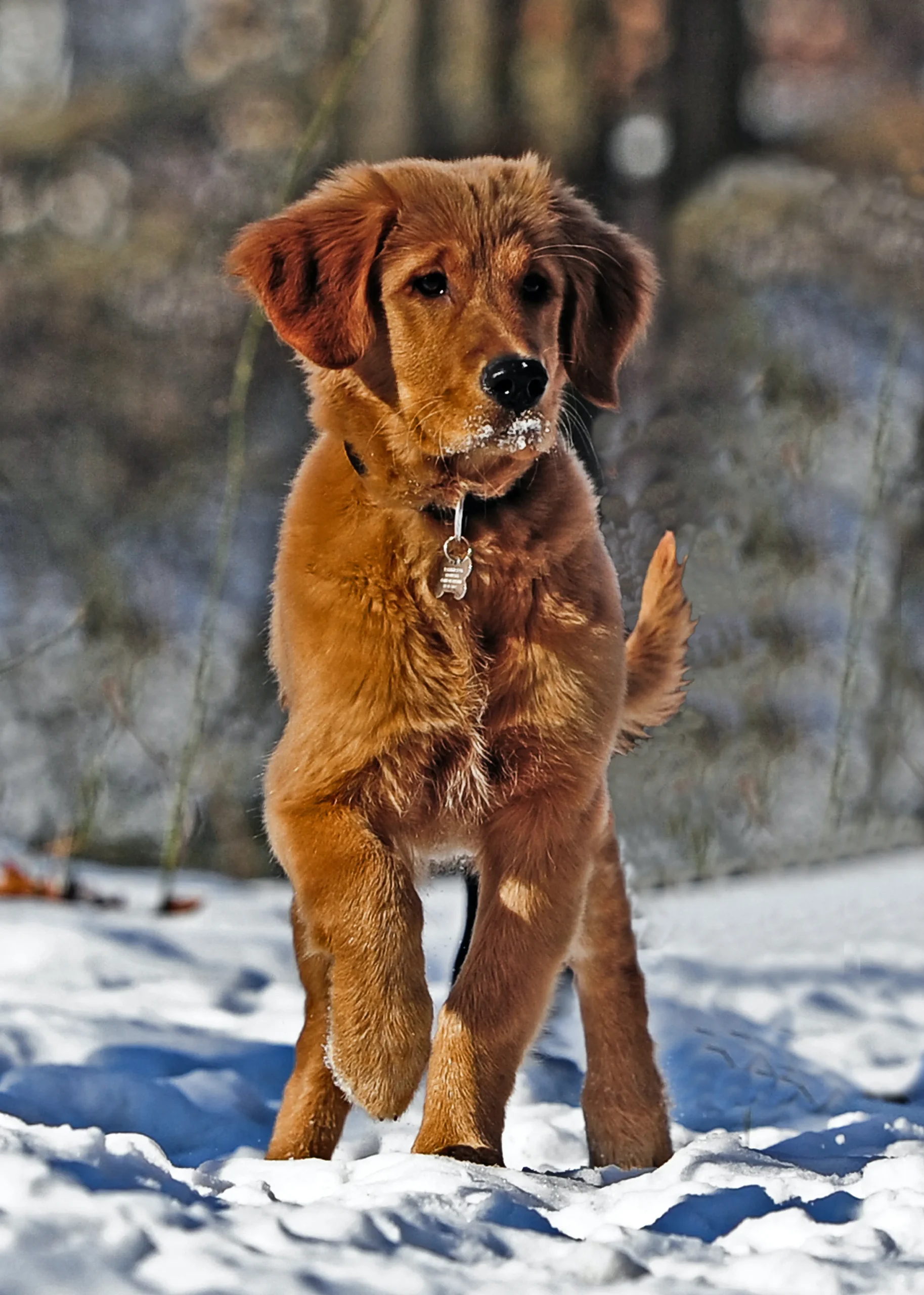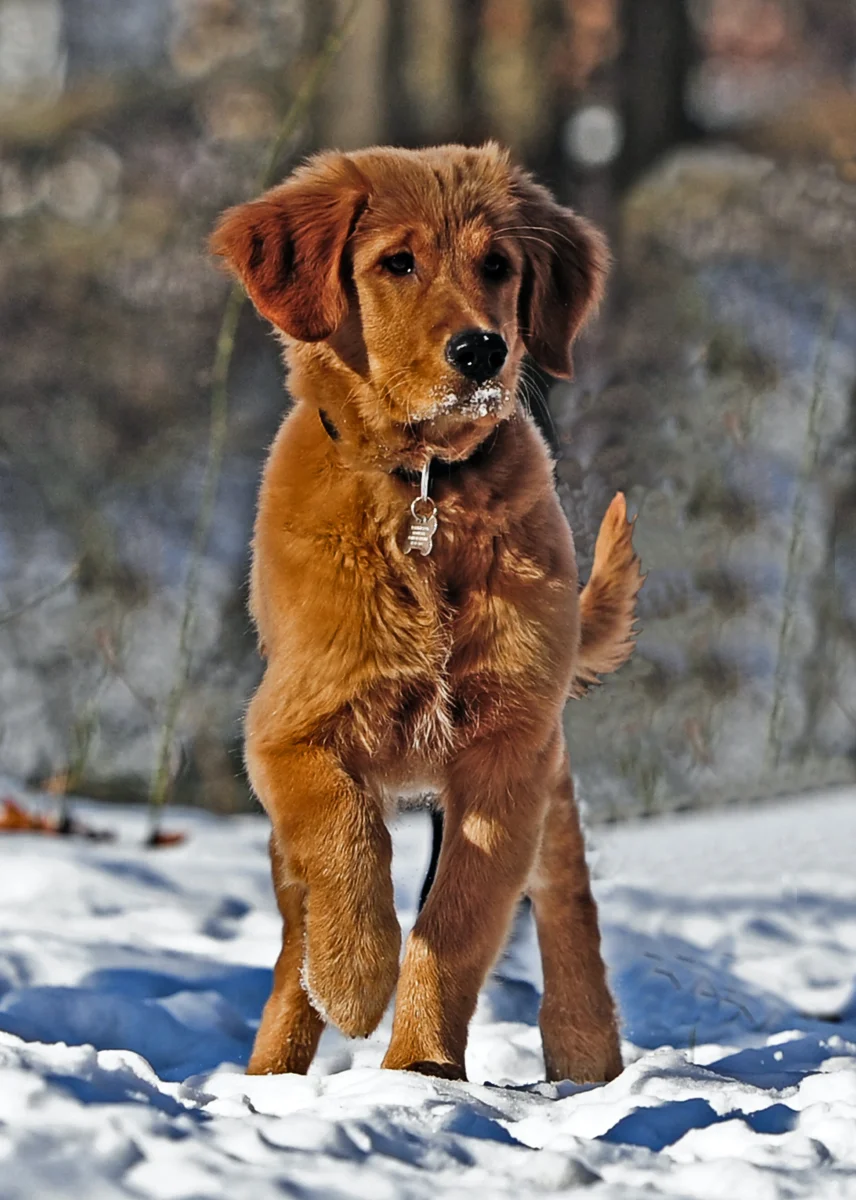Are you considering getting a mini golden retriever? If so, you may be wondering just how big these adorable pups can get. Well, you’re in the right place! In this article, we’ll explore the size of mini golden retrievers and give you all the information you need to know before bringing one into your home. From their weight range to their height, we’ve got you covered. So, let’s dive in and discover just how big these lovable dogs can grow!
When it comes to the size of mini golden retrievers, there are a few key factors to consider. First and foremost, it’s important to note that “mini” is a relative term. While they are smaller than standard golden retrievers, they are not as tiny as some other toy breeds. Generally, mini golden retrievers can weigh anywhere between 25 to 55 pounds and stand around 14 to 20 inches tall at the shoulder. Of course, individual variations can occur, but this gives you a good idea of their typical size range.
Now that you have a general idea of the size range for mini golden retrievers, you may be wondering what factors can influence their growth. Genetics play a significant role in determining the size of these dogs, as they are bred from smaller golden retrievers and potentially other smaller breeds. Additionally, their diet, exercise, and overall health can also impact their size. It’s essential to provide them with a balanced diet and regular exercise to ensure they reach their full potential in a healthy way.
History of Mini Golden Retrievers
As a dog lover and owner of a golden retriever and a Goldendoodle, you may be curious about the history of mini golden retrievers. Mini golden retrievers, also known as mini goldens or petite goldens, are a relatively new breed that has gained popularity in recent years.
The mini golden retriever is not a recognized breed by major kennel clubs, such as the American Kennel Club (AKC). Instead, these dogs are typically the result of crossing a golden retriever with a smaller breed, such as a cocker spaniel or a miniature poodle. This crossbreeding is done to create a smaller version of the standard golden retriever, while still maintaining its friendly and lovable nature.
The origins of the mini golden retriever can be traced back to the 1980s when breeders began intentionally crossing golden retrievers with smaller breeds. The goal was to create a dog that had the same wonderful traits of a golden retriever but in a smaller package. Over time, these crossbreeds started to gain recognition and become more popular among dog enthusiasts.
One reason why mini golden retrievers have become popular is their size. While not as small as some toy breeds, mini goldens are still smaller than standard golden retrievers. They typically weigh between 25 to 55 pounds and stand around 14 to 20 inches tall at the shoulder. This makes them a great choice for individuals or families who want a golden retriever companion but may not have the space or capacity to care for a larger dog.
It’s important to note that mini golden retrievers may vary in size and appearance, as their characteristics can be influenced by genetics and the specific breeds involved in their crossbreeding. Therefore, it’s essential to research the specific traits and characteristics of the parents when considering a mini golden retriever.
Despite not being officially recognized as a breed, mini golden retrievers have found a special place in the hearts of many dog lovers. Their smaller size, friendly temperament, and lovable nature make them great companions for individuals and families alike.
So, if you’re considering adding a mini golden retriever to your family, remember to do your research, find a reputable breeder, and provide them with a loving and caring home. Enjoy the company of your mini golden as they bring joy and happiness to your life.
Characteristics of Mini Golden Retrievers
Mini golden retrievers have become increasingly popular among dog lovers in recent years, thanks to their adorable looks and lovable personalities. As a dog lover and owner of both a golden retriever and a Goldendoodle, you may be curious about how big these mini versions of the beloved golden retriever breed can get.
Size and Weight
While mini golden retrievers are smaller than standard golden retrievers, their size can still vary depending on the breeding and genetics of each individual dog. On average, mini golden retrievers weigh between 25 to 55 pounds. This weight range allows them to be more manageable in terms of daily care, such as lifting and grooming, compared to their larger counterparts.
Height

« Discover the Surprising Pros and Cons of Labrador Retrievers vs. Golden Retrievers! Which Breed Reigns Supreme?
Discover the Ultimate List of Golden Retriever Names: Unleash Your Pet’s Individuality Today »
In terms of height, mini golden retrievers typically stand around 14 to 20 inches tall at the shoulder. This smaller stature makes them an ideal choice for individuals who may live in smaller homes or apartments, as they can comfortably adapt to limited living spaces. Despite their smaller size, mini golden retrievers still retain the same graceful and athletic build as their standard-sized relatives.
Temperament and Personality
One of the most endearing qualities of mini golden retrievers is their friendly and outgoing nature. They are known for their gentle and affectionate personalities, making them great companions for individuals and families alike. Mini goldens are often described as intelligent and eager to please, which makes training them a pleasant and rewarding experience.
Health Considerations
As with any dog breed, it’s important to be aware of potential health issues that mini golden retrievers may be predisposed to. Keep in mind that since mini goldens are not officially recognized as a breed, their health concerns can vary depending on the specific crossbreeding involved. Regular veterinary check-ups, a balanced diet, exercise, and proper grooming are essential to keeping your mini golden retriever happy and healthy.
Size and Growth of Mini Golden Retrievers
As a dog lover and owner of a golden retriever and a Goldendoodle, you understand the importance of knowing the size and growth patterns of your furry friends. Mini golden retrievers, also known as mini goldens or petite goldens, are a unique mix that can get everyone’s attention. Let’s dive into the size and growth of these adorable pups.
A Smaller Package with Big Personality
Unlike their larger counterparts, mini golden retrievers are compact in size. They typically weigh between 25 to 55 pounds and stand around 14 to 20 inches tall at the shoulder. This smaller stature doesn’t diminish their charm or friendly nature. In fact, mini goldens are known for their big personalities and loving dispositions, making them wonderful companions for families or individuals.
Growing Pains: The Journey from Puppyhood to Adulthood
Just like any other dog, mini golden retrievers go through different stages of growth. As puppies, they’re incredibly cute and small, fitting comfortably in your arms. But as they mature, their bodies start to fill out and develop. It’s important to remember that every puppy is unique, so their growth rate may differ slightly.
During the first few months, mini goldens experience rapid growth. By the age of one, they may have reached their maximum height. However, their weight can still continue to increase until they reach around 18 to 24 months old. Remember to provide your mini golden with a balanced diet, regular exercise, and plenty of mental stimulation during this crucial period of their development.
The Importance of Proper Care
Just like any dog, mini golden retrievers require proper care to thrive. Regular veterinary check-ups are essential to monitor their overall health and to catch any potential issues early on. A balanced diet suitable for their size and activity level, along with regular exercise, will keep them fit and happy.

Don’t forget about grooming! Mini goldens have a beautiful double coat that requires regular brushing to prevent matting and keep their fur looking fabulous. As with any dog, it’s important to give them plenty of love, attention, and positive reinforcement to foster their well-being and ensure a strong bond.
Enjoy Every Moment
Owning a mini golden retriever is a rewarding experience filled with love and joy. Watching them grow from playful puppies into loving adults brings so much happiness. Remember to cherish each moment and create lasting memories with your mini golden
Factors that Influence the Size of Mini Golden Retrievers
As a dog lover who has experience with golden retrievers and Goldendoodles, you may be curious about the size of mini golden retrievers. Just like any other dog breed, there are several factors that can influence their size. Let’s explore some of these factors:
1. Parentage: Mini golden retrievers are typically the result of crossing a golden retriever with a smaller breed, such as a Cocker Spaniel or a Poodle. The size of the mini golden retriever can be influenced by the size of its parents. If the golden retriever parent is smaller in size, the mini golden retriever is likely to be smaller as well.
2. Genetic Variation: Genetic variation plays a significant role in determining the size of mini golden retrievers. The combination of genes inherited from both parents can lead to a range of sizes within the same litter. Some mini golden retrievers may end up closer in size to the larger parent breed, while others may have a more petite stature.

3. Growth Rate: Mini golden retrievers go through different stages of growth, just like any other dog. They experience rapid growth during the first few months and continue to gain weight until they reach around 18 to 24 months old. How their growth progresses can influence their ultimate size.
4. Health and Nutrition: Proper care, diet, and nutrition are crucial in nurturing the growth and development of mini golden retrievers. A balanced and nutritious diet, along with regular veterinary check-ups, can help ensure that your dog grows to their full potential.
5. Exercise and Activity Level: The amount of exercise and activity your mini golden retriever gets can also impact their size. Regular exercise helps keep their muscles strong and their weight in check, contributing to their overall physical health.
Remember, every dog is unique and may not fit into a specific size category. While mini golden retrievers generally weigh between 25 to 55 pounds and stand around 14 to 20 inches tall at the shoulder, individual variations can occur.
Understanding the factors that influence the size of mini golden retrievers will help you make informed decisions about their care and ensure their well-being. Embrace the journey of raising a mini golden retriever, as they bring love, joy, and companionship into your life.

Common Health Issues in Mini Golden Retrievers
As a dog lover who has owned both a golden retriever and a Goldendoodle, and with a background working at animal shelters and veterinary offices, I understand the importance of being aware of common health issues in your furry companions. This is especially true for mini golden retrievers, as they may be predisposed to certain conditions. Here are a few health issues you should keep an eye out for:
Hip and Elbow Dysplasia
Just like their larger counterparts, mini golden retrievers can be prone to hip and elbow dysplasia. This condition occurs when the hip or elbow joint doesn’t fit together properly, leading to pain, lameness, and arthritis. Monitoring your mini golden retriever’s weight and providing appropriate exercise can help reduce the risk of developing these conditions.
Eye Problems
Golden retrievers, including mini golden retrievers, are known to have a higher risk of certain eye problems. These can include cataracts, progressive retinal atrophy, and glaucoma. Regular eye check-ups by a veterinarian can help identify any issues early on and ensure proper treatment.
Heart Conditions
Some mini golden retrievers may inherit heart conditions such as valve disorders or dilated cardiomyopathy. It’s important to have regular veterinary check-ups to monitor your dog’s heart health and catch any potential issues before they become more severe.
Allergies
Mini golden retrievers, like many other dog breeds, can develop allergies to certain foods, environmental factors, or even substances they come into contact with. Common signs of allergies include itching, redness, ear infections, and digestive issues. If you suspect your dog may have allergies, consult with a veterinarian to determine the best course of action.

Remember, while being aware of these common health issues is important, it’s equally crucial to provide your mini golden retriever with regular veterinary care, a balanced diet, exercise, and proper grooming. By being proactive in your dog’s healthcare, you can help ensure a happy and healthy life for your beloved furry friend.
Without a conclusion paragraph.
Training and Socialization of Mini Golden Retrievers
When it comes to training and socialization, mini golden retrievers are no different from their larger counterparts. These adorable little bundles of fur are highly intelligent and eager to please, making them a joy to train.
Here are some helpful tips to ensure that your mini golden retriever grows up to be a well-behaved and socialized companion:
- Start early: Begin training your mini golden retriever as soon as you bring them home. Puppies have a short attention span, so keep the training sessions short and fun. Use positive reinforcement techniques, such as treats, praise, and playtime, to reward good behavior.
- Basic commands: Teach your mini golden retriever basic commands like “sit,” “stay,” “come,” and “down.” These commands form the foundation of obedience training and will help you establish control and communication with your furry friend.
- Socialization: Socializing your mini golden retriever from an early age is crucial. Expose them to different people, pets, and environments to help them feel comfortable and confident in various situations. Take them to dog parks, enroll them in puppy classes, or arrange playdates with other well-behaved dogs to promote positive social interactions.
- Leash training: It’s important to teach your mini golden retriever to walk politely on a leash. Utilize positive reinforcement and take them on frequent walks to help them become accustomed to the sights, sounds, and smells of the outside world.
- Consistency and patience: Consistency is key when it comes to training any dog. Set clear rules and boundaries, and enforce them consistently. Be patient with your mini golden retriever, as training takes time and repetition. Remember, it’s all about building a bond and trust with your furry companion.
By investing time and effort into training and socialization, you can help your mini golden retriever become a well-rounded and well-behaved member of your family. Remember to make training sessions fun and positive, and always reward good behavior.

Continue reading to learn more about the care and health of mini golden retrievers.
Exercise and Diet for Mini Golden Retrievers
As a dog lover and owner of a golden retriever and a Goldendoodle, you understand the importance of providing the best care for your furry friends. When it comes to mini golden retrievers, it’s essential to focus on their exercise and diet to ensure their health and well-being.
Exercise plays a crucial role in keeping your mini golden retriever happy and healthy. These energetic dogs love physical activities and need plenty of exercise to burn off their energy. Aim for at least 30 to 60 minutes of exercise every day to keep them mentally and physically stimulated. This can include walks, jogs, playtime at the park, or engaging in interactive games like fetch. Remember, a tired dog is a well-behaved dog!
Next, let’s talk about diet. Providing your mini golden retriever with a balanced and nutritious diet is key to their overall health and vitality. Consult with your veterinarian to determine the appropriate diet for your dog based on their age, weight, and any specific dietary requirements.
Regular feeding schedule is important for maintaining proper digestion and preventing obesity. Divide their daily food intake into two or three smaller meals to avoid overeating. Always ensure that fresh water is available for them to drink throughout the day.

When selecting dog food, look for high-quality options that contain a good balance of protein, carbohydrates, healthy fats, and essential vitamins and minerals. Avoid foods that contain excessive fillers, additives, or artificial ingredients. Opt for formulas specifically designed for medium-sized breeds to meet their unique nutritional needs.
In addition to exercise and diet, don’t forget to give your mini golden retriever lots of love and attention. Mental stimulation is just as important as physical exercise, so engage them in interactive play, puzzle toys, and training sessions to keep their minds sharp and engaged.
Remember, every dog is unique, so it’s important to monitor their weight, energy levels, and overall well-being. Regular veterinary check-ups will help ensure that your mini golden retriever remains in optimal health.
Pros and Cons of Owning a Mini Golden Retriever
Pros
1. Adorable Size
One of the biggest advantages of owning a mini golden retriever is their adorable size. They are smaller than standard golden retrievers, making them perfect for individuals or families who may have limited space or a smaller living environment.
2. Energy and Exercise
Mini golden retrievers still possess the same energy and enthusiasm as their larger counterparts but require less exercise. This means that you can still enjoy their playful nature and active lifestyle without feeling overwhelmed. A 30 to 60-minute walk or playtime session can be enough to keep them happy and healthy.

3. Easier to Handle
Due to their smaller size, mini golden retrievers are generally easier to handle than their larger counterparts. They can be more manageable on walks, in the car, or in social settings. This makes them a great choice for individuals who prefer a dog that is not too physically demanding.
Cons
1. Potential Health Issues
Mini golden retrievers may be prone to certain health issues, such as hip dysplasia or elbow dysplasia. It’s essential to choose a reputable breeder who carefully selects their breeding dogs to minimize the risk of these genetic conditions. Regular veterinary check-ups are crucial to monitor their health and catch any potential issues early on.
2. Limited Availability
Mini golden retrievers are not as commonly found as their standard counterparts. This may mean that it could be more challenging to find a reputable breeder or rescue organization that has mini golden retrievers available for adoption. It’s important to do your research and be patient in your search.
3. Potential for Separation Anxiety
Just like any other dog, mini golden retrievers can develop separation anxiety if not properly trained or provided with enough mental stimulation and attention. It’s important to ensure that you can provide them with the love, care, and companionship they need to avoid any behavioral issues.
While owning a mini golden retriever has its pros and cons, their smaller size and playful nature can make them a delightful addition to your family. Remember to provide them with the love, care, exercise, and attention they need to thrive and be happy. Regular veterinary check-ups and a balanced diet are also crucial for their overall health and well-being.

Conclusion
Mini golden retrievers are a great choice for individuals or families looking for a smaller dog that still possesses the friendly and lovable traits of a standard golden retriever. They are well-suited for those with limited space, as they are smaller in size. Despite their smaller stature, mini golden retrievers still require regular exercise to keep them happy and healthy. With 30 to 60 minutes of activity per day, they will thrive in your care.
Handling a mini golden retriever is generally easier compared to a standard golden retriever, making them a popular choice for those who prefer a less physically demanding dog. However, it’s important to note that mini golden retrievers may be prone to certain health issues. Regular check-ups with a veterinarian are essential to ensure their well-being.
While finding a reputable breeder or rescue organization for mini golden retrievers may be more challenging due to their rarity, the effort is worthwhile. With proper training, mental stimulation, and attention, mini golden retrievers can make a delightful addition to any family. Just remember to provide them with the care and love they deserve.







